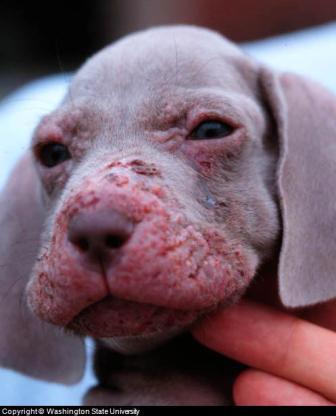
Allergy Rash On Dogs Face. In the event of an individual being allergic to cats dogs or other furry animals the patient is likely to become congested and keep sneezing. But two canines can be revealed to the same allergen and they will have very different reactions. Finding the cause of the allergic reaction whether its to a food fleas or something in their environment is the most effective way to treat the irritated skin. A study published in Oral Biology indicates that dog saliva has at least 12 known allergy-causing bands.
The dogs saliva contains proteins that in cases like yours are allergens your body detects as a threat and reacts. However because the dogs saliva can be transferred to the dogs hair I am surprised that you are. A flea bite allergy is also known as flea allergy dermatitis. A dog with a swollen face is suffering from an acute allergy most likely related to an insect bite or sting. The most common reason for skin rashes in dogs is allergies. More to this the study goes further to indicate that there can be an oral transmission of the allergy-causing bands.
In fact it is not the grass causing the skin irritation but the grass pollen.
A few flea bites on a dog that is allergic to flea saliva can trigger itching and scratching for weeks. Fleabites food and things in the environment such as pollen grasses and trees. There are three common types of skin allergy that link to the main allergic triggers. Most of the time folliculitis in dogs – or simply irritation of the skin and hair follicles – is a symptom of an allergen parasite or infectionWhile the majority of these rashes are harmless they can be irritating to both people and pets and are contagious because some dog skin diseases can be transmitted to humans. The most common food allergies in dogs are beef dairy chicken corn wheat soy and. Excessive itching and scratching Rubbing against objects like furniture andor trees Excessive licking of the effected area A dogs.
